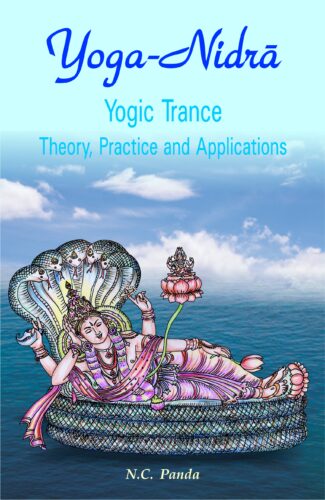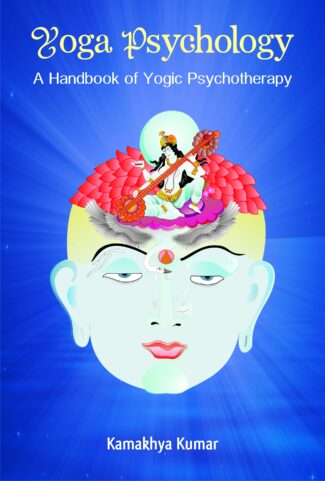Showing 31–33 of 33 results

Dr. N. C. Panda examines yoga-nidra as a scientific discipline the theory, its psychological basis, its techniques and applications to reveal its significance as a means of strengthening the bodys immune system and preventing and curing diseases and regulating ones life patterns. It involves comparative analyses like that of yogic trance and hypnotic trance and yoga-vedanta and Freudian psychologies.
Healing of body and mind through yoga is gaining immense significance at present as a world-wide science of therapy. In this context, yoga-nidra, a self-therapy technique of yoga and tantra, is important as an effective means of regulating the mind. In this volume, Dr. Panda, a noted philosopher and psychologist, yogi and tantrist, delves into the principles and practices of yoga-nidra based on materials from the tantras and Patanjali Yoga in an attempt to explain its benefits with special reference to modern medicine. The book presents yoga-nidra as a scientific discipline that is a potent means to strengthen the bodys immune system and thus to prevent and cure diseases and to regulate ones life patterns. It examines in detail the theory of yoga-nidra, going into the Indian concept of mind and personality. It establishes the psychological basis of yoga-nidra by comparing hypnotic trance and yogic trance and Freudian and Yoga-Vedanta psychologies. It then lucidly presents the techniques of yoga-nidra and deals with the applications of yoga-nidra with relation to curing of psychosomatic and other diseases of common occurrence and to solving current problems such as drug-addiction and stress-induced maladies. This well-conceived and thorough research work will prove useful to scholars of ancient Indian medical science and psychology, particularly those concerned with study of yoga vis-a-vis modern medical problems and systems. It will be of equal importance for the general readers owing to its interesting subject matter, simple style of presentation and easy adoption by the non-adepts.

The sound practice of yoga enables one to have a disease-free body and keen intellect. This book details the impact of various yoga practices on psychology and specifies that consciousness has a wider conation in yoga in developing one’s personality traits and leveraging them further to keep him/her happy and experience a blissful life.
Yoga psychology is both a positive and a normative science. It not only analyses human personality and its growth, but sets normative ideals and prescribes techniques to achieve such objectives, as well. Thus, expansion of consciousness and making oneself the master of his/her mind are the broad objectives of yoga psychology. The topological aspect of mind as described by Freud in terms of conscious, subconscious and unconscious levels was well detailed in the yogic literature, thousands of years ago. The sound practice of yoga enables one to have a disease-free body and keen intellect.
The book, thus, details the impact of various yoga practices on psychology and specifies that consciousness has a wider conation in yoga. Yoga presents vivid and sound meditation procedures for the attainment of psychic consciousness through the awakening of kundalini. Homeostasis or balance is the central principle in yoga psychology, and it holds that any sort of imbalance in the system physical, psychological or pranic creates disorders and the solution lies in rebalancing it. Here comes the role of yogic psychotherapies such as prarthana, mantra sadhana, spiritual couselling, pranayama, yajna, sankirtana, svadhyaya and vrata anushthana.
This volume enunciates that yoga psychology is an applied science, and thus has remedies for many individual and social problems. It deals at large with the application and benefits of yogic practices in developing ones personality traits and leveraging them further to keep him/her happy and experience a blissful life.

The sound practice of yoga enables one to have a disease-free body and keen intellect. This book details the impact of various yoga practices on psychology and specifies that consciousness has a wider conation in yoga in developing one’s personality traits and leveraging them further to keep him/her happy and experience a blissful life.
Yoga psychology is both a positive and a normative science. It not only analyses human personality and its growth, but sets normative ideals and prescribes techniques to achieve such objectives, as well. Thus, expansion of consciousness and making oneself the master of his/her mind are the broad objectives of yoga psychology. The topological aspect of mind as described by Freud in terms of conscious, subconscious and unconscious levels was well detailed in the yogic literature, thousands of years ago. The sound practice of yoga enables one to have a disease-free body and keen intellect.
The book, thus, details the impact of various yoga practices on psychology and specifies that consciousness has a wider conation in yoga. Yoga presents vivid and sound meditation procedures for the attainment of psychic consciousness through the awakening of kundalini. Homeostasis or balance is the central principle in yoga psychology, and it holds that any sort of imbalance in the system physical, psychological or pranic creates disorders and the solution lies in rebalancing it. Here comes the role of yogic psychotherapies such as prarthana, mantra sadhana, spiritual couselling, pranayama, yajna, sankirtana, svadhyaya and vrata anushthana.
This volume enunciates that yoga psychology is an applied science, and thus has remedies for many individual and social problems. It deals at large with the application and benefits of yogic practices in developing ones personality traits and leveraging them further to keep him/her happy and experience a blissful life.
| There are no products |